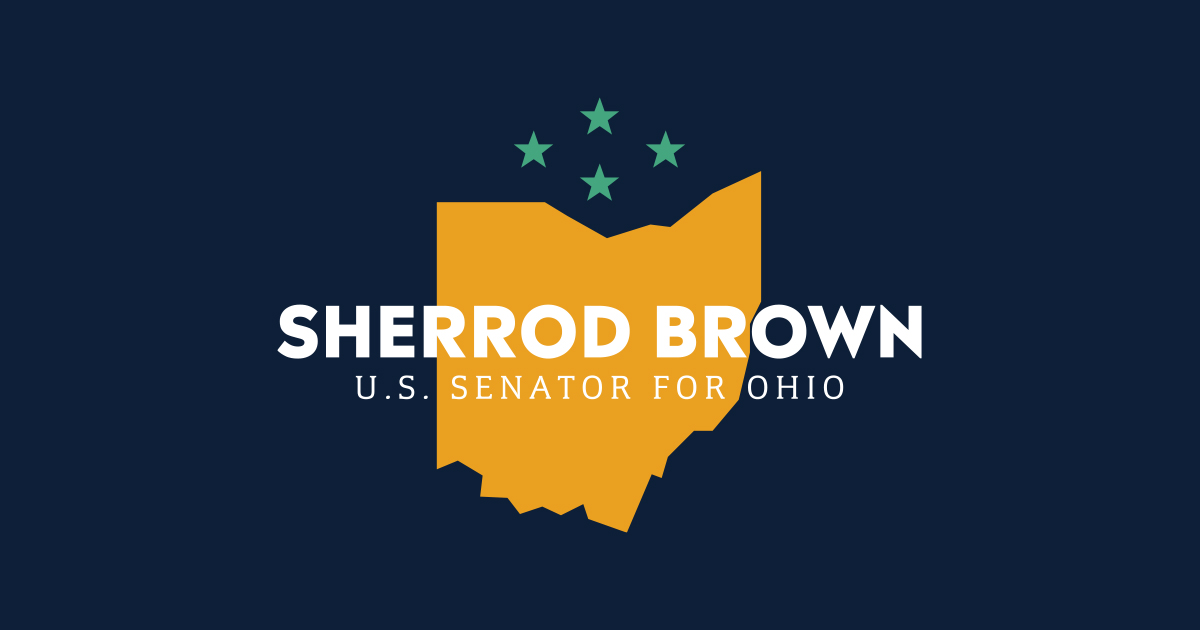Source: United States Senator for Ohio Sherrod Brown
WASHINGTON, D.C. – Last week, U.S. Sen. Sherrod Brown (D-OH) visited communities across Ohio to push for Congress to invest in America’s infrastructure. He also made stops to meet with workers and volunteers at a local foodbank, visit a small business that was kept afloat during the pandemic with the help of Payment Protection Program (PPP) loans, and meet with school administrators and local farmers to discuss ways to bolster rural agriculture programs.
During stops in Toledo, Lima, Columbus, and Zanesville: Brown met with local officials, community leaders, and residents to discuss the need to improve Ohio’s roads and bridges, repair water and sewer systems across the state, and better support the child care industry for both workers and parents. Brown is working in Congress to pass these critical investments in Ohio’s infrastructure and communities.
Read what they’re saying about Brown’s infrastructure stops across Ohio:
NBC 4, WNWO, Toledo: Sherrod Brown visits Toledo to talk federal infrastructure plan
- “[Brown] said infrastructure is more than just roads and bridges. It also includes child care and water quality, something that has been a major concern in Toledo for nearly a decade.”
The Toledo Blade: Sen. Brown visits Toledo to push for infrastructure investment
- “For Toledo residents, the plan’s success means safer water, lower utility bills, and a reduced risk of lead poisoning. The new infrastructure will boost economic development and public health in the region, while cleaning a polluted Lake Erie, the source of Toledo’s drinking water, Mr. Brown and other Democratic leaders said.”
Lima News: Brown: Lima on right path, would benefit from Biden plan
- “Brown went on to praise the city for improvements it has made to its water infrastructure in recent years. Lima Mayor David Berger also advocated for the proposal, saying that it would provide funding that would not only update the city’s water systems, but open up new opportunities as well.”
Zanesville Times Recorder: Sen. Brown: Good-paying jobs, broadband on horizon with federal infrastructure bill
- “What would a massive federal infrastructure investment mean for Southeast Ohioans? If you ask U.S. Sen. Sherrod Brown, it’d mean new jobs — good-paying ones at that. Putting more than $1 trillion in federal money into infrastructure projects across the nation would fund critical, long-neglected infrastructure improvements and bring some economic opportunities in the process, according to the Cleveland Democrat, who pitched the American Jobs Plan bill to community members Thursday at Secrest Auditorium. But this bill isn’t just about roads, bridges and highways. It redefines the term ‘infrastructure,’ pitching day care, schools, education, health care and broadband internet as the next generation of public works in America. If passed in its current form, the bill says it would deliver broadband to every area that lacks it.”
Brown also made stops in Cleveland and Athens: where he met with workers and business owners. In Cleveland, Brown met with the staff, volunteers, and National Guard members at the Greater Cleveland Food Bank who have scaled up operations to feed hungry Ohioans during the pandemic. In Athens, Brown visited Federal Hocking Middle School to discuss his support for local agriculture and farm to school programs, which help open up new markets for local farmers while providing schoolchildren healthy meal options. Brown then met with the owners of Brenen’s Coffee Café to hear how small business PPP funds in American Rescue Plan helped local businesses like this stay afloat. Brown helped write and pass this legislation into law.
Read more about what they’re saying about Brown’s visits to Cleveland and Athens:
WTAM, Cleveland: Food Bank To Continue Muni Lot Food Distributions
- “U.S. Senator Sherrod Brown, on Wednesday, visited the Greater Cleveland Food Bank, where Brown thanked Food Bank staff and volunteers for all they do to help the needy, while Food Bank officials thanked Brown for his support of federal funding for programs that allow the Food Bank to provide meals to needy children while school is out.”
NBC 3, WKYC, Cleveland: Sen. Sherrod Brown visits Greater Cleveland Food Bank to highlight efforts to feed Ohioans during COVID-19 pandemic
- “Brown also focused on the important work the GCFB is doing to help Ohio families in need, as well as their work to make families aware of the relief programs and benefits available to them – including the Child Tax Credit (CTC). Brown was one of the biggest proponents for the expansion of the CTC in the American Rescue Plan and is working to make it permanent.”
WSYX, ABC 6, Columbus: How far did the Paycheck Protection Program go and was it worth it?
- “Brown said small businesses needed help more than big businesses during the pandemic. He says paying back the debt incurred by the $300 billion second PPP installment, along with the rest of the recovery packages, will be easier now.”
The Athens Messenger: Sen. Sherrod Brown visits Athens County
- “Federal Hocking Local School District was recently awarded an implementation grant to invest in the district’s Farm to School program, a program that aims to enrich students’ lives through education and bringing locally grown, farm-fresh food into schools.Brown lauded the program. ‘It will teach local kids in the school system more about foods and brings more money into the community,’ Brown said.”
- Brown also stopped at Brenen’s Cafe in Athens to meet with the owners and discuss the success of Paycheck Protection Program (PPP) loans. […] Dani Underhill, president of the Athens Area Chamber of Commerce, said the PPP loans were crucial in preserving Athens’ service-industry-reliant uptown economy. ‘It meant everything,’ Underhil said. ‘I mean truly — that federal funding helped give a life preserver to our businesses who were floundering in the toughest parts (of the pandemic),’ Underhill said. ‘It was literally the deciding factor between some businesses staying afloat and some businesses having to close.’
